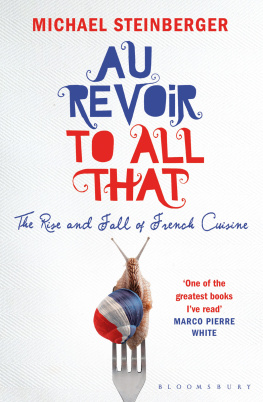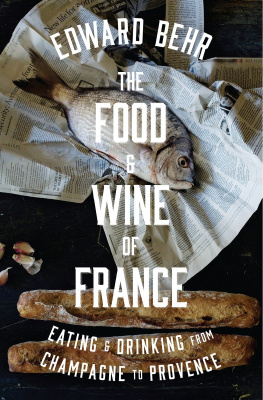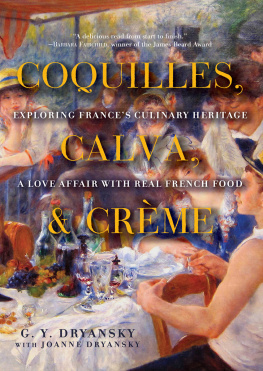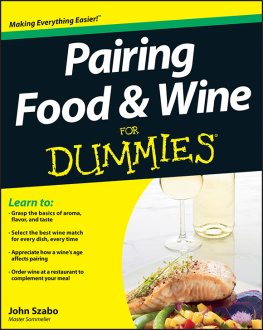Although only one name is on the cover, this book was a collaborative effort, and many debts of gratitude are owed.
In the course of researching the book, I solicited the views and enlisted the help of numerous people, and most of them could not have been more generous with their time and thoughts. There are far too many to name here, but my thanks to all. A handful of people were kind enough to read parts of the manuscript and to offer feedback and suggestions. Many thanks to Steven Kaplan, Colman Andrews, Mark Williamson, Nicholas Lander, Steven Jenkins, Rahul Jacob, Tyler Colman, David Schildknecht, Gwen Robinson, Tyler Cowen, and Guy Gteau.
One of the smartest things Ive ever done as a journalist was writing to Jacob Weisberg to broach the possibility of doing wine pieces for Slate . My association with Slate is a source of immense pleasure and pride. My editor, Julia Turner, is a joy to work with; my thanks to her, as well as to Jacob and to David Plotz. I am also grateful to the Financial Times and wish to thank the following people there: Rahul Jacob, Jancis Robinson, Nicholas Lander, Charles Morris, Tom OSullivan, and David Owen.
I was fortunate to work with several terrific people at Bloomsbury. I am indebted to Annik La Farge for the confidence that she showed in me, and to Nick Trautwein for his skillful editing and infinite patience. I knew, from the moment that I first spoke with Nick, that he was exactly the kind of editor I wanted: intelligent, low-key, and with a sense of humor. I feel very lucky to have had him as a partner in this project. Michael Fishwick of Bloomsbury in London showed great enthusiasm for the book throughout its development and made some superb suggestions, as well. Many thanks also to Jenny Miyasaki for so masterfully guiding me through the production process, and to Janet McDonald, whose copyediting was amazingly thorough and much appreciated.
My agent, Larry Weissman, patted me on the back when I deserved it, read me the riot act when I needed it, and has become a very good friend along the way. His excitement about this book reinforced mine, and he has been an invaluable source of counsel and support. His wife and partner, Sascha, offered excellent advice with the proposal, and my thanks to her, as well.
Without Georges Martel, my wife and I might never have become romantically involved, the idea for this book might never have germinated, and researching it would not have been possible. Georges is family, and my debt to him is enormous. Nor would the book have been feasible without my in-laws, Joseph and Keiko Brennan, who were of great help to my wife during the many weeks that I was away researching the book and during the many months when I was sequestered in my office writing it. My brother, David Steinberger, offered much appreciated support and encouragement, as well. I also want to thank Brian Shames and Eric Tagliacozzo, dear friends both.
My grandfather, Dr. Laszlo Steinberger, died a few days after I turned in the manuscript. He was a month shy of his ninety-sixth birthday, and while I had hoped he would be around to see the book in print, he at least had the satisfaction of knowing that it was headed to the printer. This book is also dedicated to him, as well as to the memory of my other grandparents, Violet Steinberger and Dr. Max and Helen Alpert.
I wish to express my gratitude to my parents, John and Rita Steinberger. I left a promising job on Wall Street to pursue a career as a journalist. Most parents would have been horrified; mine encouraged me to give up investment banking for writing, and they have been a source of steadfast support ever since. I hope this book, in some small way, repays their faith in me.
Lastly, I want to thank my wife, Kathy Brennan, and my children, James and Ava. I long ago noticed that authors, in acknowledging their debts of gratitude, invariably speak of the burdens that book writing imposes on their families. Id hoped to avoid sounding that hackneyed refrain by not allowing the book to be a burden on mine. No such luck: As challenging as this project was for me, it was doubly so for them. No young children should have to suffer the sight of their unshaven father pacing the halls like a zombie day after day, muttering to himself. As for what my wife enduredwell, lets just say that mile Jung was absolutely right: She is mango woman, and I cant begin to thank her enough for all that she did to make this book possible. Kathy, James, and Ava should know that they are my rock and inspiration, and this book is as much theirs as it is mine.
In October 2009, it was announced that McDonalds would be opening a restaurant in the food court of the Louvre. The news came as a shock to many art lovers, who were aghast at the prospect of the Venus de Milo sharing space with the golden arches. In truth, the food court was already home to several other fast-food restaurants, and despite these affronts to good taste, the Louvre had managed to remain one of the worlds preeminent museums. It would surely survive McDonalds. As a culinary matter, however, this latest conquest by McDonalds carried an undeniable symbolism: Allowing the American fast-food chain to peddle Big Macs and frites on the grounds of the Louvrean institution as emblematic of France as the tricolor flag itselfmarked another downward spike in Frances food culture.
The global economic crisis that began in 2007 hit France hard, and not surprisingly, the recession was a boon for the fast-food industry. In 2008, a year that saw an estimated six thousand traditional restaurants go out of business and left thousands of others teetering, McDonalds France recorded an 11 percent annual jump in sales. The sharp economic downturn seemed to cement a shift in dining habits: More and more, the French just wanted to eat cheaply and quickly. According to a hospitality industry trade group, almost half the restaurant meals eaten in France were now enjoyed at fast-food establishments. In the face of this shifting culinary landscape, several eminent chefs decided to follow Alain Ducasses lead, embracing the trend toward restauration rapide . In 2008, Paul Bocuse opened a fast-food joint in Lyon called Ouest Express, offering sandwiches, salads, and hot entrees. A second outlet opened in 2009, and there was talk of additional expansion and possibly even franchising. Marc Veyrat and Guy Martin, three-star recipients both, started sandwich shops of their own, and Thierry Marx, a two-star chef based in Bordeaux, planned to launch a cooking school devoted to street food.
Traditional restaurants received some welcome news in March 2009, when the European Union gave France permission to cut the value-added tax on restaurant meals from 19.6 percent to 5.5; the same rate applied to fast-food establishments. The measure took effect July 1. Frances finance minister, Christine Lagarde, said the change would preserve and improve [Frances] culinary reputation and revitalize its restaurant sector. However, restaurants were not legally obliged to pass along the savings to diners. In exchange for reducing the VAT, the Sarkozy administration had extracted a pledge from restaurant trade associations to create forty thousand new jobs, and had urged restaurateurs to be generous with customers and drop their prices. But the early indications were not promising. Some restaurant owners said they needed to keep the money if they hoped to stay in business, while others said they intended to use it to hire more staff or to raise salaries. A study released by Frances tourism ministry several weeks after the VAT reduction was implemented found that while big restaurant chains had cut prices accordingly, only around one third of independent restaurants had done so, stoking fears that the government might revoke the tax cut.
But the VAT cut, no matter how effective, was unlikely to reverse the changes taking place at the highest levels of French cuisine. In late 2008, Olivier Roellinger, the chef and owner of a three-star restaurant in Brittany called Les Maisons de Bricourt, announced that he was renouncing his Michelin rating and closing the restaurant. This was perhaps an even more shocking development than Alain Senderens decision to relinquish his three stars in 2005. In contrast to Senderens, whose best years were behind him, Roellinger had won his third star in 2006, and was at the peak of his creativity. In the summer of 2009, Jean-Franois Pige, one of Frances most acclaimed young chefs, walked away from a three-star rating before hed even achieved it. Pige, the chef at the Hotel Crillon in Paris and a protg of Ducasses, had been seen as a lock for three stars. But following the example of his predecessor, Christian Constant, he decided not to wait for Michelins ultimate accolade and quit the Crillon. Not only that, he followed Constant to the rue Saint-Dominique, where he had taken over a famous old brasserie called Thoumieux. This charming street in the seventh arrondissement thus became the place where former Crillon chefs went to reinvent themselves, spurning the Michelin Guide in the process.
Next page






